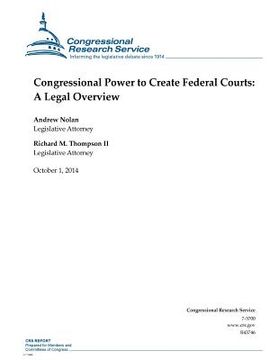Synopsis "Congressional Power to Create Federal Courts: A Legal Overview (in English)"
The United States Constitution established only one federal court-the United States Supreme Court. Beyond this, Article III of the Constitution left it to the discretion of Congress to "ordain and establish" lower federal courts to conduct the judicial business of the federal government. From the very first, Congress established a host of different federal tribunals to adjudicate a variety of legal disputes. The two central types of federal "courts"-courts established under Article III and those tribunals that are not-differ in many respects, including with regard to their personnel, purposes, and powers.Courts established pursuant to Article III are mainly defined by the three central constitutional provisions to which they are subject: resolution of cases that only present live "cases or controversies," lifetime tenure, and salary protection. The primary purpose for these safeguards was to insulate the federal judiciary from potential pressures, from either the political branches or the public, which might improperly influence the judicial decision-making process.Notwithstanding Article III's seemingly literal command that the "judicial power" shall extend to all cases "arising under" the Constitution or federal law, Congress has assigned a host of cases arising under federal law to non-Article III bodies. Unlike Article III judges, these bodies, generally referred to as "non-Article III courts," "legislative courts," or "Article I courts," enjoy neither lifetime tenure nor salary protection. There are two main categories of non-Article III courts. The first are standalone courts, created under Congress's Article I power, which have similar authority as Article III courts, such as entering their own judgments and issuing contempt orders. Examples of legislative courts include the United States Tax Court; the Court of Federal Claims; the Court of Appeals for Veterans Claims; the Court of Appeals for the Armed Forces; and federal district courts in Guam, the Virgin Islands, and the Northern Mariana Islands. The second category of non-Article III tribunals is commonly referred to as "adjuncts" to Article III courts. This category is mainly comprised of federal administrative agencies and magistrate judges.

